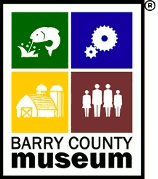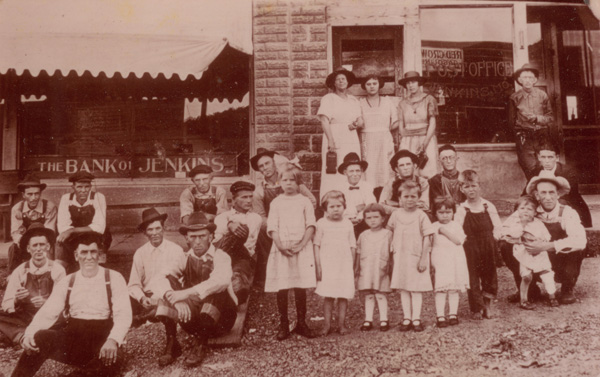 |
Bank of Jenkins and Post Office |
History of Jenkins from Back to Barry by F.M. Cornman
Jenkins, one of a few communities that has retained its original name since its origin, received its name from the first white settler in this part of Barry County, a man named Jenkins, who first lived near the mouth of a small creek that took his name – Jenkins Creek, on what is now a part of the farm owned by Ausby Ross, and as the location was too low he moved later to a point just southwest of what is known as the Potter Cemetery, and was the first white man buried in this cemetery. This settlement was made in the early 1800's or late 1790's. I do not have the exact date. Legend has it that at his death there was a deep snow in midwinter, and Washburn, being the nearest white settlement, his wife started on foot to get help in burying him. On the way she met a party of friendly Indians who helped her to Washburn. With some of them going to her cabin to wait for her return for the burial.
The land around Jenkins was later taken as claims or homesteaded, as near as I can determine, by early settlers as follows: The land on which Jenkins last lived was taken as a claim by a family named Stockton. It was here that David Stockton was killed by renegades known as bushwhackers, while he was on furlough from the Union Army during the Civil War. His brother, Jefferson Stockton, made his escape by crawling through a small window of the cabin, as I've heard him say, a small knot hole. The renegades spied him and began shooting at him. He fell behind a bank. They thought they had killed him so they did not stop to investigate. He escaped and later regained his regiment in the Union Army. He survived the war, and later homesteaded land joining the old claim, which was later homesteaded by the Potter family. A descendant, Chas. Potter, now owns this farm, which passed through three generations. This farm lies north of Flat Creek, and about 3/4 mile west of the village of Jenkins.
The farm lying between this one and Jenkins was also occupied before the Civil War by the Short family of the old Short and Lock Feud fame in which several of each family were killed. The Locks lived up Flat Creek toward McDowell. Barry and Jonah Short of east Barry County are descendants of this family. This land was later homesteaded by Joseph Periman, who at one time had many descendants in Barry County. However, most of those are now dead or have moved away - among whom were his sons William, Allen, Linzie, and Peter Periman, and several daughters, two of whom married Hensons. Later Allen Periman built the first house in Jenkins, and the house was first occupied by Selmand Fare. This farm passed through several hands, being bought from Periman by a man named Withers, who presented it to his daughter Mrs. Josie Williams, and her daughter, Mrs. Dora Fiscler, then became the owner.
|
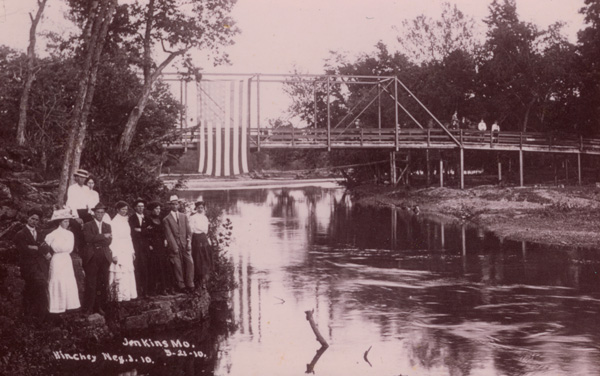 |
Jenkins Missouri, May 21, 1910 |
U.R. Williams, the present owner, is on relation to the former owner Williams. This farm, lying north of the old Jenkins-Stockton claim was homesteaded by Carel Fare and is now part of the Potter farm, and of the Cornman farm, but has passed through the hands of many owners. This farm was originally part of a claim settled by a man known as Peg Leg Young. Just north of this land lies a tract that was settled as a claim by Joseph Fare who later sold his claim to Horatio O. Cornman about 1879, who had homesteaded 160 acres, and Amanda Hudson homesteaded the adjoining 160, later adding them into one farm after their marriage. Later other land was added to make a farm at one time amounting to 520 acres, but now being 376 acres. This farm heired by myself, and sold to Mr. and Mrs. Gus Killingworth the present owners. Forty acres, the east end of this place was first settled by Gideon Bolin, grandfather of Gideon Bolin now living east of Jenkins. This claim was later owned by a man named Binnum, and bought by Cornman.
Lying north and west of the Cornman farm is the old Fare farm, homesteaded by Joseph Fare, later being owned by D.F. Fare. Later it was owned by the Mills Bros. - Robert, Lewis and Tom - Robert later acquired it and selling it to Bud Fare, the present owner. This farm was the last one in the old original Jenkins school district, and on Flat Creek. East of this farm is the farm now occupied by Joseph Thomas and his mother, Zenia Thomas. This farm was homesteaded by a man by the name of Barnett, passed to C.P. Albright, then to the Thomas family prior to World War 1. Lying east of this land is 80 acres that were settled by Abe Quarrels about 1895, then occupied by William Cowell, and later bought by Nathen Thomas, then bought by Ola Ray and is now owned by his wife and son. Mrs. Ray, and son Bob, now own a tract of land that once comprised a number of farms. The one where the Ray home stands was settled by George Long about 1892 or 93, Ola Ray , later buying it. The south part of his farm was, as far as I know, settled by James Mattox in the 1880's, becoming the property of Henry Thomas, then Ola Ray. Another tract, lying east of this land, and owned by the Ray family was settled by the George Irby family before the Civil War. Mr. Irby served in the Union Army. This land was later owned by a Mr. Gilmore, and George Galloway. It then became a part of the Ola Ray farm. Lying east of this land is the McCubbin land which later was owned by Ab Galloway, and then to Ola Ray. There was a house for years on the south part of the Irby farm occupied by Homer Neely for years then Joe Stockton, and a Hoover family - possibly others.
North and east of the Ray farm is the Onis Thomas farm which was settled before the Civil War, also owned by Dock Thomas, passing to ,Johnnie and Lemmon Thomas, then to Onis Thomas, a grandson of Dock Thomas. There are several descendants of the Thomas family in this community. A part of this farm was settled by a man named Bacon which passed to his daughter and son-in-law, Mr. and Mrs. Luther Chaney. This was later owned by a nonresident by the name of Parr. Onis Thomas later owned it. This farm was the last farm in the northeast part of the original Jenkins school district, and now brings us to the farm owned by Mr. Spearman which to my knowledge was settled by Marion Hilton around 1885, and passing to his daughter, Mrs. Iva Baxter, and husband John Baxter. She sold this farm to Mr. Spearman. The next place south, and joining Jenkins was settled by William Periman's father, Joseph Periman. Later William became owner. He also owned what is part of the Cornman land – 20 acres now belonging to Bill Gautney, originally belong to myself, Ferd Cornman, then Ted Fare, now Bill Gautney. The old home part of the place going to William Periman's son Earnest Periman, then to Jewell Periman, the niece of William. Other parts of the place being divided between other children - H.L. Periman, Dr. Isaac Periman and Joseph Periman. The part falling to H.L. (Henry) Periman had been settled by Lemman Suttles and bought by William Periman going to H.L. Periman, and later to his wife after his death by drowning in 1927, two sons, Bill and Eschol, were both drowned at the same time when a truck they were driving plunged into Jenkins Creek north of Jenkins.Mrs. Periman sold 40 acres to Ferd Cornman, 20 acres of which he later sold to Ted Fare. Mrs. Periman sold the home 40 acres to Lee and Fred Wiley. They sold to a man named Smith, he to George Lawson, he to Clarence Lett, he to Dock Young, the present owner, who built the first broiler farm in the Jenkins community. U.R. Williams acquired the part of the Periman farm that went to Joseph and Dr. Periman, and is part of the original Short farm. This now brings us to the east of Jenkins to the James Baxter farm settled in the 1880's, and now owned in part by Ausby Ross and F.M. Cornman. This land passed from James Baxter to Oliver Baxter and to Clay Stubblefield, to Ausby Ross, then 23 acres containing the old Baxter home place to F .M. Cornman. Ausby Ross still owns the remainder of the Baxter farm on which Baxter built his first cabin. |
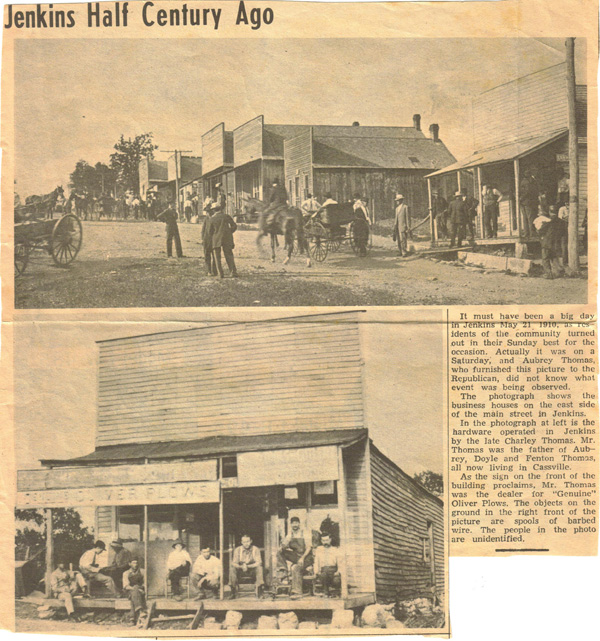
|
Jenkins Store in 1910 |
This land lying east and south of Jenkins was settled in early days, as far as I know, by the Huse family and Mr. Huse, to the best of my knowledge, was the first postmaster of Jenkins. The post office which was at his home southwest of the 44 highway bridge across Flat Creek about V. mile from this bridge. There is no house there now. This is also the place where Jeff Stockton, who I mentioned earlier, was found frozen to death after wading Flat Creek one night before Thanksgiving about 1900. This place was owned later by George Galloway, then J.W. Garris.
This brings us to the land on which Jenkins stands, and covers most of the land in the original Jenkins schooldistrict. There have been other additions to the school from time to time. The village of Jenkins was built on land owned originally by William Periman, and 40 acres owned by Melving Galoway. Allen' Periman built the first house in Jenkins where the feed storage building of the William's store now stands, and the first store building stood where the building Opal Huse now lives in is. It was a two story building used for store on the ground floor and a community hall, and Grand Army of Republic Hall. School was even held here also church. I went to my first school here. Low Boucher was the teacher then, later Mrs. Abe Quarrels. These schools were subscription schools. This was in 1891 and 1892. I was just 5 years old at that time, and I doubt if there is anyone else now living in Barry County that attended one of these schools.
|
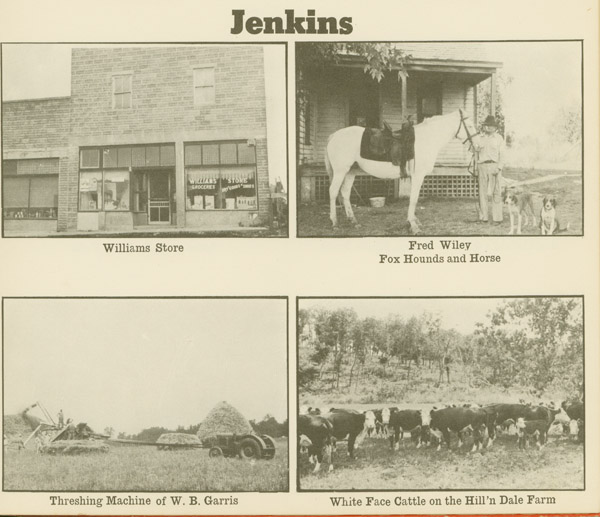 |
Jenkins in 1937 from Barry County in Pictures |
If I remember correctly, a man named Tennison had the first store in Jenkins, then Jim Thomas, who came from Aurora, Mo. and bought corn, and hogs in exchange for goods from the store. Next were the Galloway brothers, sons of Melvin Galloway, who owned the land on the west side of the street Jenkins is built on. Ab and Frank Galloway built a new store building on the corner on the west side of the street and their slogan was "We buy anything" and they did - from cattle to eggs and all the things farmers had to sell them.
Jeff Cocran then put in a drug store. It was known as "the blind tiger" because of the illegal liquor sales. It was the kind that made men crazy. As Iremember, they said he would buy a barrel of good whiskey then put one-half into another barrel, then add a large plug of flat tobacco and one can of concentrated lye to each barrel and fill both with water and stir. Then he had two barrels of liquor for the price of one plus the tobacco and lye.Those were the days when the other children and I had to sometimes take to the fence to keep from being run over by drunks racing their horses.
Carol Fare put in the first blacksmith shop in Jenkins and Ide West worked with him. Robert Bailey put in the first hardware store. When the Galloway store burned after two or three years, Henry Thomas and Henry Short then put in a store later having a store each on opposite sides of the street. In 1893, the school district of Jenkins was organized from parts of Springhill, now Leann, Lone Elm, now a part of Jenkins, and Clio, also now a part of the Jenkins school. The first directors were James Potter, William Periman, and James Barnett. H.O. Cornman was clerk, a position held by Cornman until his death in 1918. I, his son, still have most of the school records from 1893 to 1918. I took his place for several years, but passed the records on to my successor, Barney Fiscler, and do not know what became of them.
U.R. Williams was then clerk for a number of years until his health and pressing business caused him to resign. Mrs. Lester Purdom is now clerk. J. W. Irby was the first teacher in the newly formed district in the year 1893. His school register now in my possession, shows 58 children attended school that year. Now in that same area, there are 3 grade and 4 high school children living and I think of at least 12 houses that had families living where there are no houses now and the remaining homes in the original district are either singles, widows, widowers or couples without children. |
 |
Beside Jenkins VFW hall |
There were many different merchants in Jenkins since the first ones, also many blacksmiths. The merchants, as I remember, were: Tennison, J. Thomas, Galloway Bros. Short and Thomas, Henry Thomas, Henry Short, Leroy Smith, Warren Mondy, Ab Galloway, Frank Galloway, Underwood and Son, Carol Fare, Nick Eubanks, McNatt Bros., W.H. Benett, McNabb Bros., Tom Highbarger, Chas. Bennett, Earnest and Harry Periman, Jeffries Bros. Potter Bros. (Will and John) , E. Suttle, Tom Purdom, Martin Suttles, C.J. Thomas, U.R. Williams, Onis Thomas, Joe Periman and maybe others Ido not remember.
The mill was built by J.W. Shepherd about 1892-3. It was later owned by Hall, Garris, McNatts, Hoovers, Onis Williams and was enlarged by Russell and Roberson. It was owned by Davis Bros., Hackry and Sons and others. It burned about 1920 or later. The canning factory was built cooperatively in 1901, and was later operated by McCarter and King, by Thomas and Thomas and others. It stood idle several years and finally burned. Many store buildings burned in years gone by, also many homes.
At one time Jenkins had three blacksmith shops, two hardware stores and three general stores, and a drug store. Also at one time a good sound bank of which Albert Thomas was cashier. Later Roland Haddock, Lewis Thomas, Lester Pewitt were cashiers. Jenkins also had a dentist office, a telephone system and from one to three doctors. For many years doctors practicing in Jenkins in the early days were Dr. Knight, Dr. Wheeler, Dr. Wilderson, Dr. Jones, Dr. Hadman, and another Dr. Wheeler, Dr. Wilson, Dr. Dummitt, Dr. Periman, Dr. Slaughter and perhaps others that I have forgotten.
Blacksmiths I remember were Carol Fare, Ide West, Jim Zinn “Big” Jim Zinn, George Zinn, Jacob Zinn, Ben Zinn, Frank Sawell, and Mr. Fisk, Bill Bazter, Frank Reese, John Reese, William Eller, and others. Ben Zinn still is a blacksmith, but does not do much work as was once done. He is one of the very few left in all Barry County.
The Jenkins school district was enlarged on the east several years ago and on the south. It has also been enlarged in recent years to take all of Clio, Lone Elm and Willow Branch districts, and a bus route established and still there are not as many children attending from all this territory as was in Jenkins in 1893. There have been hundreds of people come and gone since Jenkins was first started, and at times there were as many as 125 persons living in Jenkins. Now there are 24 people living here. One hardware store, and one general store and post office combined, one filling station and shop in connection with the hardware and the V.F.W. which took the place of the G.A.R. They have a hall here.
The first post office named Jenkins was operated by Mr. Huse at his house near where the town now is. The first post office in Jenkins proper was a member of the Galloway family, and was in the home of Melvin Galloway. Later Henry Thomas became postmaster. There have been many postmasters since. Some that I can remember were Anna Fare, J.M. Caldwell, Henry Thomas, George S. Thomas, U.R. Williams, George Thomas, Charles Thomas, Onis Thomas, and again V.R. Williams. The first mail carrier in my remembrance was Ed. Eldredge, a former stagecoach driver, and the foulest mouthed man in my memory. He carried many passengers in those days, and if he had a lady, and a man with him on a trip, he usually got the man to one side and told him to not talk to him as he could not keep from "swaring" if he had to talk, and he did not want to talk before ladies. A Mr. Cope followed him as mail carrier. Sometimes the carrier left Aurora in the morning getting to Jenkins about noon, then they would change, and it would leave Jenkins; and return in the evening and there averaged a new carrier at least one a year. There were so many that I can't remember them all, but John Lawson was the first to make the trip in a car. Everyone said that it could never be carried successfully by auto, and made a lot of fun of him for trying, but now we would think it could not be done with horses and mules, as mules were more often used. The auto caused the most decline in business in small towns for now we go to Aurora or Cassville, and even Springfield. |
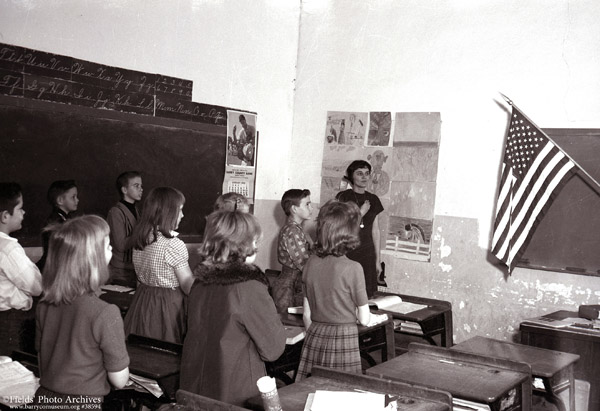 |
Jenkins School 1965-66 |
| |





